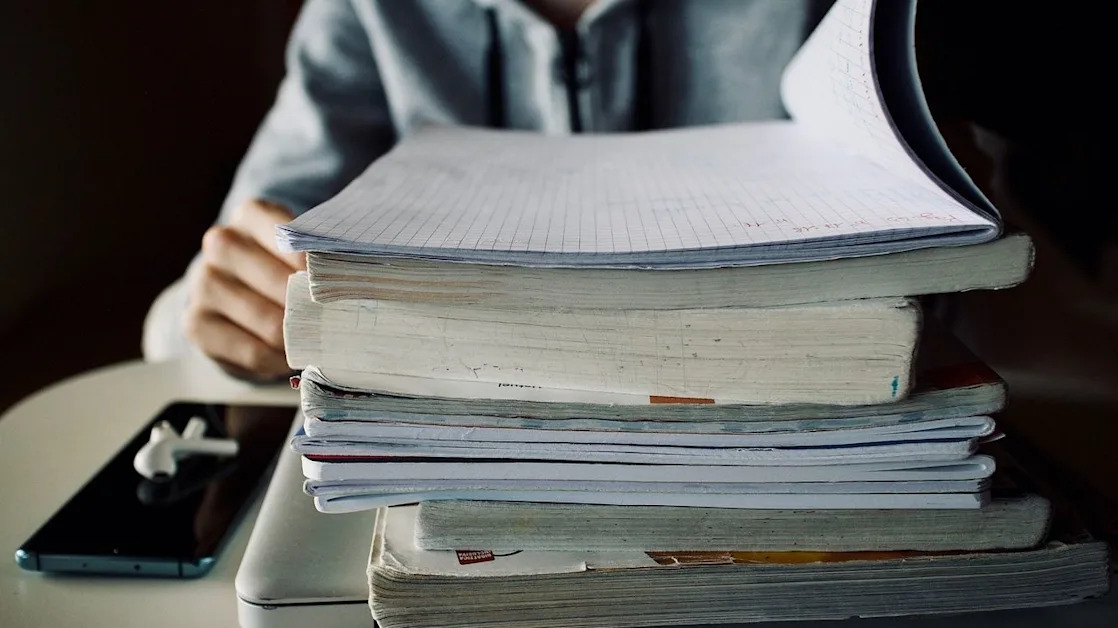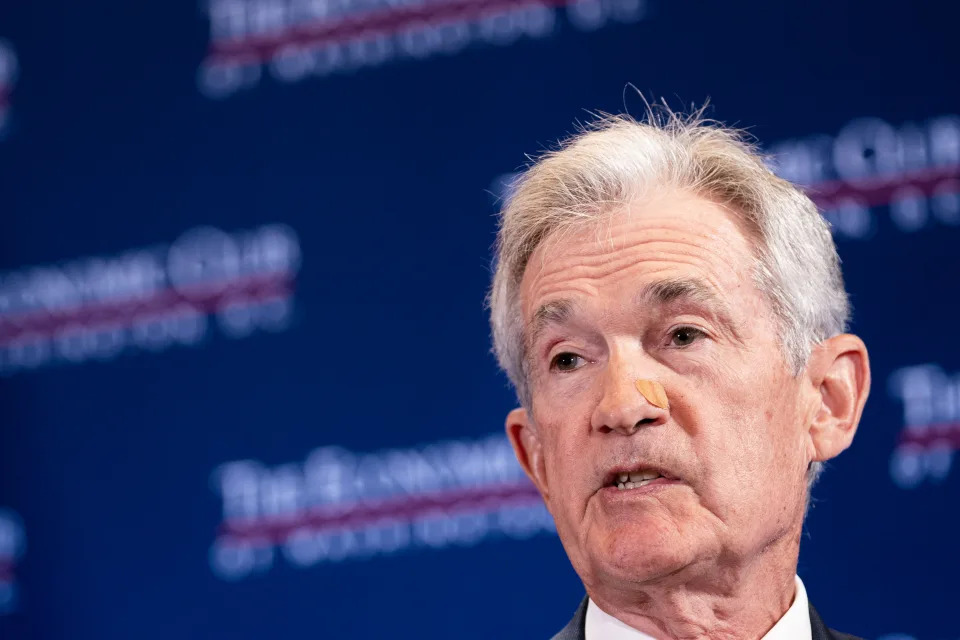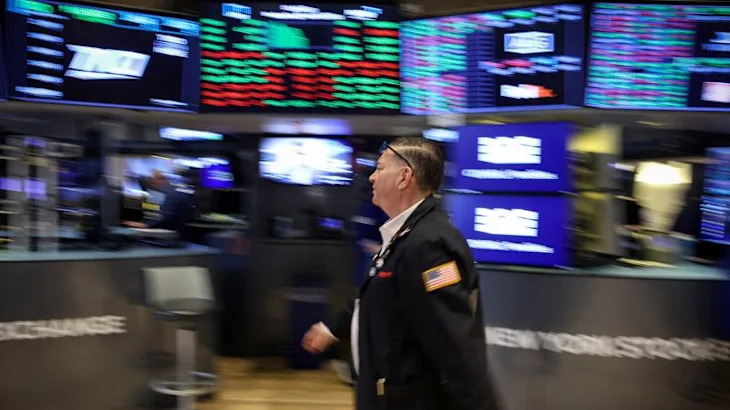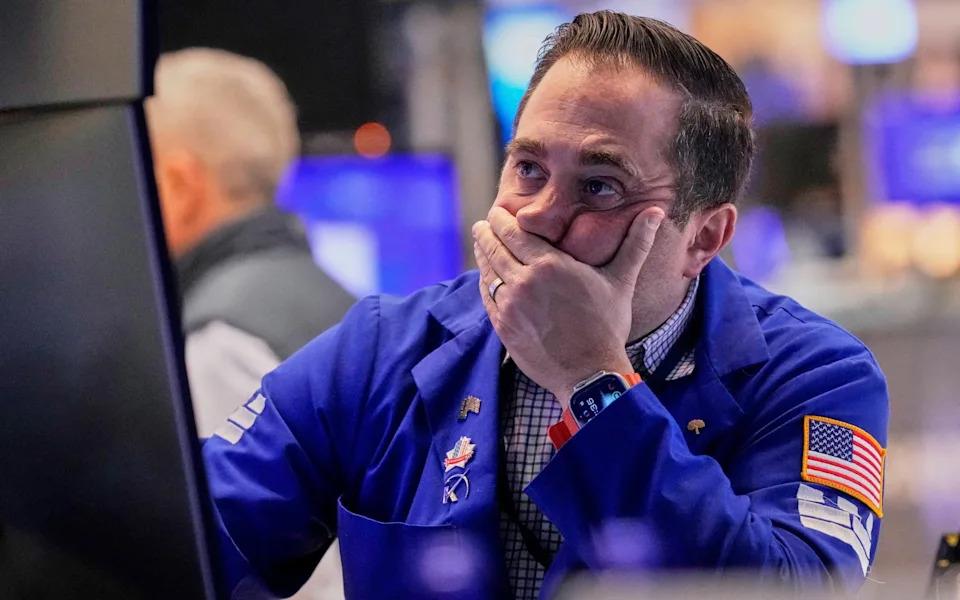
The chairman of the Federal Reserve has warned that Donald Trump’s trade war will fuel inflation and keep interest rates higher for longer, triggering a steep sell-off on Wall Street.
Jerome Powell said the Fed was unlikely to make progress tackling inflation this year because of the president’s tariffs. It raises the prospect that borrowing costs will have to stay higher for longer.
US stocks slumped in response, with the Nasdaq down over 4pc and the S&P 500 down more than 3pc in the wake of the comments. Traders had been betting that the Fed would cut interest rates at least three times before the end of the year ahead of Mr Powell’s comments.
The Fed chairman told the Economic Club of Chicago on Wednesday night: “The administration is implementing significant policy changes, in particular trade… and the effects of that are likely to move us away from our goals.
“So unemployment is likely to go up as the economy slows in all likelihood and inflation is likely to go up as tariffs find their way and some part of those tariffs come to be paid by the public.”
The comments contradict the claim by Mr Trump who this week said he had “already solved inflation”. Inflation has been falling and reached 2.4pc last month, down from a peak of 9.1pc in June 2022.
The president has repeatedly suggested that tariffs are not inflationary, claiming that they are “tax on foreign countries to enrich our citizens”, rather than something American consumers pay.
However, Mr Powell said: “We’re always going to be aiming for maximum employment and price stability. I do think we’ll be moving away from those goals for the balance of this year, or at least not making any progress, and then we’ll resume that progress as we can.”
Mr Powell also suggested that the Fed may struggle to keep a lid on both inflation and maintain a healthy jobs market, saying: “We may find ourselves in the challenging scenario in which our dual-mandate goals are in tension.”
He suggested that tackling inflation would take priority, as “without price stability, we cannot achieve the long periods of strong labour market conditions that benefit all Americans.”
The Fed has a target of keeping inflation at 2pc and the comments were widely interpreted as a sign that the central bank will keep borrowing costs higher for longer.
The suggestion is likely to anger Mr Trump, who earlier this month claimed it was the “perfect time” for Mr Powell to cut interest rates and accused the Fed chairman of “playing politics”.
Rick Meckler, of Cherry Lane Investments in New Jersey, said: “[Powell] is taking a very mainstream view of what these tariffs mean for both inflation and growth, one that is in opposition to how the administration has been portraying it.”
The Fed chair said that he was surprised by the size of the tariffs imposed by the president, which reach as high as 145pc on imports from China. Mr Powell said the levies were “certainly larger than we expected”.
The comments are the first by Mr Powell since wild swings in stock and bond markets last week, triggered by tit-for-tat tariffs imposed by both Washington and Beijing on each other.
The Fed chair said: “You’ll probably see continued volatility. But I wouldn’t try to be definitive about exactly what’s causing that.”
He ruled out intervening to support stock markets and said that they were working as they should.
“I would just say markets are orderly and they’re functioning kind of as you would expect them to in this time of high uncertainty,” he said.
It came after official figures were released showing UK inflation slowed down for the second month in a row in March on the back of falling petrol prices.
The rate of consumer prices index (CPI) inflation eased to 2.6pc for the month, from 2.8pc in February.
The Office for National Statistics (ONS) also said a drop in the price of computer games contributed to the lower inflation reading.
“This is very much the calm before the storm,” former Bank of England rate-setter Michael Saunders said. “And we’ll start to see the effects on the economy of Storm Donald with the Trump trade wars.”
08:00 PM BST
Signing off...
Thanks for joining us here on the live blog.
That’s all for today. You can follow all the latest business news and commentary here .
06:40 PM BST
Fed chairman warns that tariffs will increase inflation
The head of the US Federal Reserve has warned that Donald Trump’s “evolving” policies will increase inflation, with effects that could linger.
In a speech to Economic Club of Chicago, Jerome Powell said: “Tariffs are highly likely to generate at least a temporary rise in inflation. The inflationary effects could also be more persistent. Avoiding that outcome will depend on the size of the effects, on how long it takes for them to pass through fully to prices, and, ultimately, on keeping longer-term inflation expectations well anchored.
“Our obligation is to keep longer-term inflation expectations well anchored and to make certain that a one-time increase in the price level does not become an ongoing inflation problem.
“As we act to meet that obligation, we will balance our maximum-employment and price-stability mandates, keeping in mind that, without price stability, we cannot achieve the long periods of strong labour market conditions that benefit all Americans.
“We may find ourselves in the challenging scenario in which our dual-mandate goals are in tension. If that were to occur, we would consider how far the economy is from each goal, and the potentially different time horizons over which those respective gaps would be anticipated to close.”
Earlier this month, Mr Trump claimed it was the “perfect time” for Mr Powell to cut interest rates and accused the Fed chairman of “playing politics”.
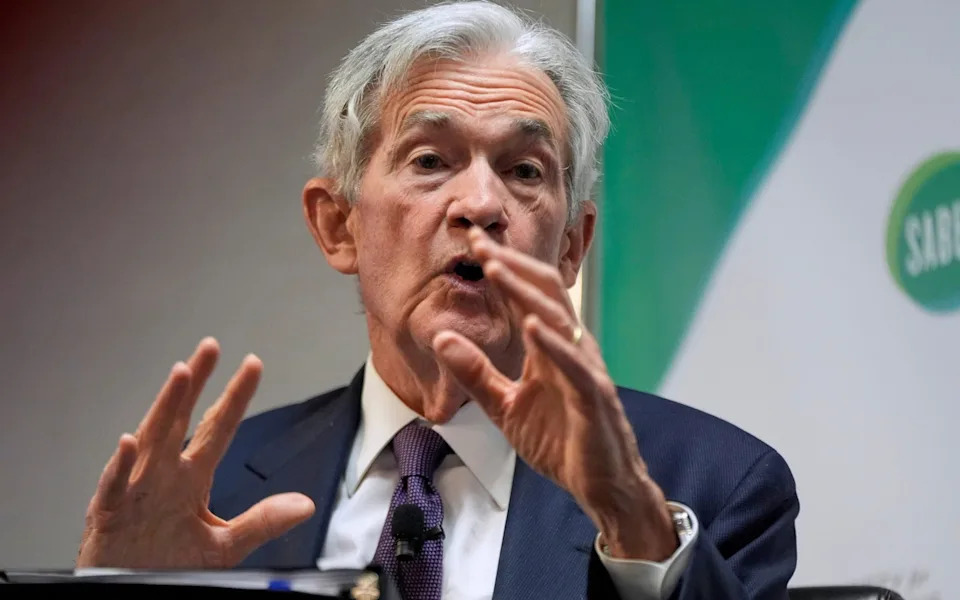
06:15 PM BST
China to blast US at UN for ‘bullying’
China will convene an informal United Nations Security Council meeting next week to accuse the United States of bullying and “casting a shadow over the global efforts for peace and development” by weaponising tariffs.
The move comes as Beijing pursues a hardline stance in an escalating trade war with Washington triggered by Donald Trump’s steep tariffs on items imported from China.
“All countries, particularly developing nations, are victims of unilateralism and bullying practices,” read the brief for the informal UN meeting on “the impact of unilateralism and bullying practices on international relations”.
The brief, inviting all 193 UN member states to attend the April 23 meeting, specifically criticises the United States for imposing tariffs.
“By weaponising tariffs as a tool of extreme pressure, the US has gravely violated international trade rules, and triggered severe shocks and turbulence in the world economy and multilateral trading system, casting a shadow over the global efforts for peace and development,” it said.
The Telegraph has invited the US State Department to comment.
05:49 PM BST
European borrowing costs fall amid jitters about US debt
Eurozone government bond yields fell as investors turned to European debt markets amid jitters about the US.
The yield on Germany’s 10-year bonds, the benchmark for the eurozone, dropped to 2.505pc from 2.536pc yesterday afternoon.
The eurozone benchmark has been a major beneficiary of the tariff-induced market turmoil.
It is trading broadly at the same level as in early March before the announcement of a historic shift in German borrowing sent the German 10-year yield above 2.9pc.
04:55 PM BST
FTSE 100 closes up despite latest tariff war turbulence
The FTSE 100 closed up 0.3pc after world markets were hit by the latest salvo in Donald Trump’s trade war.
London’s benchmark index spent most of the day in negative territory, despite official data showing that UK inflation slowed more than expected in March.
On Wall Street, the S&P 500 is down 1pc, the Nasdaq is down 0.9pc and the Dow Jones is down 0.3pc.
It came as chip stocks were sold off after Mr Trump opened the door to tariffs targeting semiconductors and chip-making equipment.
Fawad Razaqzada, an analyst at City Index, said: “It’s another stark reminder that geopolitics and technology remain deeply entangled - and that markets will continue to dance to Washington’s tune, whether they like it or not.”
He added: “Markets continue to suffer from the White House’s tariff flip-flopping.
“The stop-start nature of US trade policy this month has made long-term positioning something of a fool’s errand, with volatility dominating the landscape.”
04:40 PM BST
US retail sales rise on car buying rush
US retail sales rose in March, powered by car purchases as consumers scrambled to get ahead of Donald Trump’s tariffs, writes Samuel Montgomery .
The value of retail purchases unadjusted for inflation rose 1.4pc last month to $734.9bn (£555.5bn), the most in over two years, according to the US Commerce Department.
Consumer spending at motor vehicles and parts dealers rose 5.3pc from a month earlier.
Lydia Boussour of EY said the uptick indicates Americans had been rushing through car purchases in the period before Mr Trump’s steep levies came into effect.
She said: “Faced with extreme uncertainty, consumers rushed to buy durable goods in March to avoid price hikes from steep tariff increases.
“But with the economy set to cool sharply in the coming months as tariffs take their toll, price-sensitive consumers are poised to become more judicious with their spending and reduce their non-essential purchases.”
Spending in the US has been supported by wage growth and a robust job market, but the simmering global trade war has
Spending at restaurants and bars increased by 1.8pc on the previous month, supported by wage growth and a robust jobs market, but a simmering global trade war could threaten consumer confidence.
Dan North of Allianz Trade said: “Consumers have to have willingness to buy, and the ability.
“The ability is provided by disposable income, and that’s slowing down as well. So the outlook after this month isn’t particularly encouraging.”
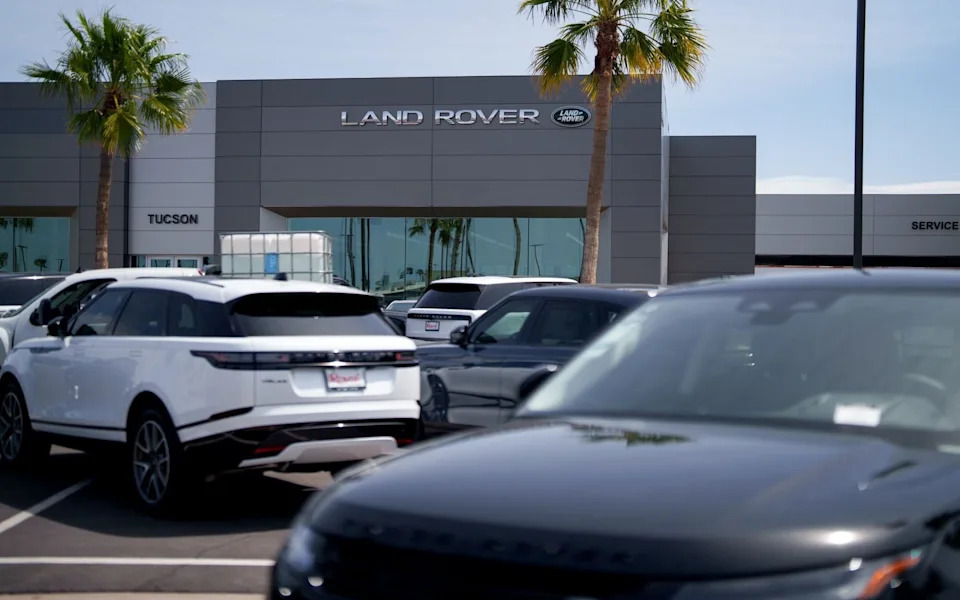
04:28 PM BST
FTSE rises after day in the red
The FTSE 100 index has recovered all of today’s losses after dropping around 0.8pc this morning. It is currently up 0.3pc, writes Max Head .
London’s benchmark index fell as the US announced limits to sales of Nvidia chips to China, with President Trump expected to announce semiconductor tariffs later this week.
Nick Saunders, chief executive of Webull UK, said: “It’s still all connected with the concerns about global tariffs and slowdowns ... there’s nervousness in the market. Any bad news or any hint of bad news is being punished severely.”
Worst affected was distribution giant Bunzl, which is down 27pc, after it cut its 2025 forecast. It said the cut was in part “to reflect the operational challenges faced by our largest business in North America” and warned of “significant uncertainties relating to tariffs and their impact on inflation and economic growth”.
The biggest riser today is mining company Endeavour. It rose by as much as 8pc after investment firm Blackrock raised its stake to over 13pc.
04:16 PM BST
Global chipmakers plunge as Trump steps up his trade war
Global chip stocks are being battered today on fresh fears over Donald Trump’s zig-zagging trade policy.
Nvidia warned of a $5.5bn (£4.1bn) hit after Washington restricted exports of its AI processor tailored for China, while Dutch chip-making tools giant ASML raised doubts about its outlook.
The US restriction, which also hit the MI308 processor of Advanced Micro Devices, marked the latest blow for the AI chip trade that is losing steam after a two-year rally as tariff threats and fears over Big Tech’s spending weigh on sentiment.
Nvidia shares fell 7pc, with the company set to lose roughly $150bn in market value today. AMD fell 6pc as it warned of a $800m hit from the latest curb, while Britain’s Arm dropped 3.1pc.
Michael Ashley Schulman, chief investment officer at Running Point Capital, said: “The US export restrictions on Nvidia’s H20 chips highlight the growing geopolitical uncertainty enveloping the tech and semiconductor sectors, particularly under Trump-era-style policy reversals.
“This unpredictability rattles businesses and investment markets, as evidenced by Nvidia’s sell-off this morning and broader pressure across chip stocks.”
04:07 PM BST
US can live with Trump’s current tariffs, say economists
The US economy can adjust if Donald Trump sticks to his current tariff rates, leading economists have said.
Capital Economics said the US should avoid a recession if Mr Trump extends the current pause on his highest levels of “reciprocal” tariffs.
The economists said: “Under our assumption that, with the notable exception of China, the overall increase in the effective tariff rate is limited to around 10pc points, we would expect the negative impact on the real economy to be muted.
“We anticipate that most of the additional tax revenues will be recycled into the economy, as additional tax cuts included in the Republican’s upcoming major budget reconciliation.
“Moreover, with the dollar unexpectedly weakening and, except for China, most other countries severely limiting their retaliation, any decline in exports should be modest.”
04:00 PM BST
World Bank calls on poorer countries to cut trade barriers
The head of the World Bank has urged developing countries to lower tariffs and liberalise trade after Donald Trump imposed higher trade levies globally.
Ajay Banga, president of the UN financial institution, said that many developing countries had high tariffs and lowering them could offset the risk of Mr Trump’s “reciprocal” tariffs.
He told reporters that global uncertainty was contributing to a more cautious business and economic environment, but said there was also untapped potential in deeper economic integration within regions.
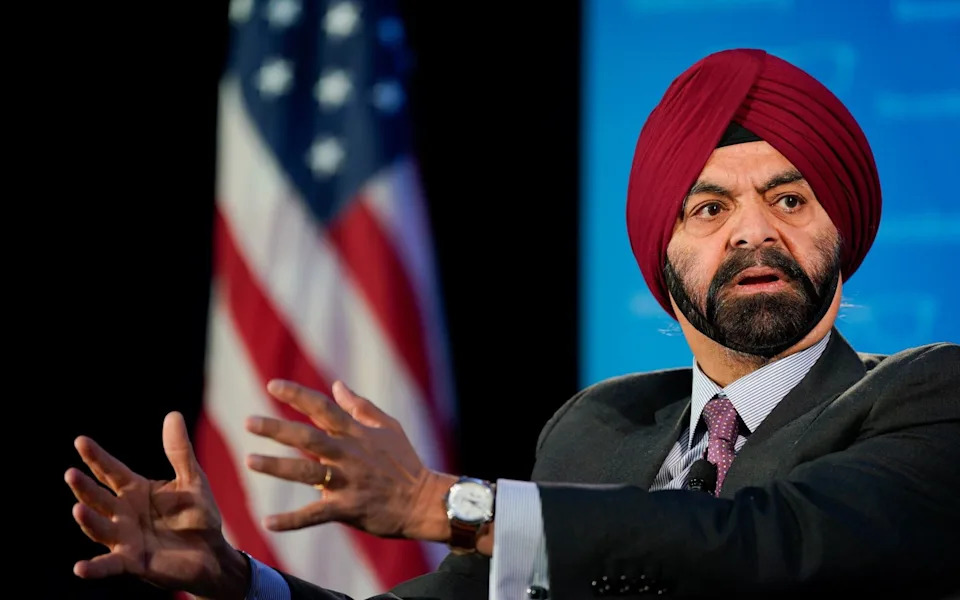
03:50 PM BST
US industrial production falls as Trump ramps up trade war
Industrial production in the world’s largest economy fell last month as Donald Trump trailed his so-called “liberation day” tariffs.
Production in the US economy fell by 0.3pc in March, a sour end to a strong quarter where output rose 5.5pc on an annual basis.
Despite the fall, the US Federal Reserve, which published the data, said that strong contributions came from the production of motor vehicles and parts and for the aerospace sector.
It came amid warnings that Mr Trump’s trade war could push the economy into recession.
Karen Dynan, of the Peterson Institute for International Economics, said: “The US economy will slow sharply this year, as new tariffs and other American policy shifts dampen activity and fuel high global uncertainty.
“Average annualised growth is projected to step down from 2.5pc in 2024 to just 0.1pc in 2025, with the probability of a recession over the next 12 months at 40pc.”
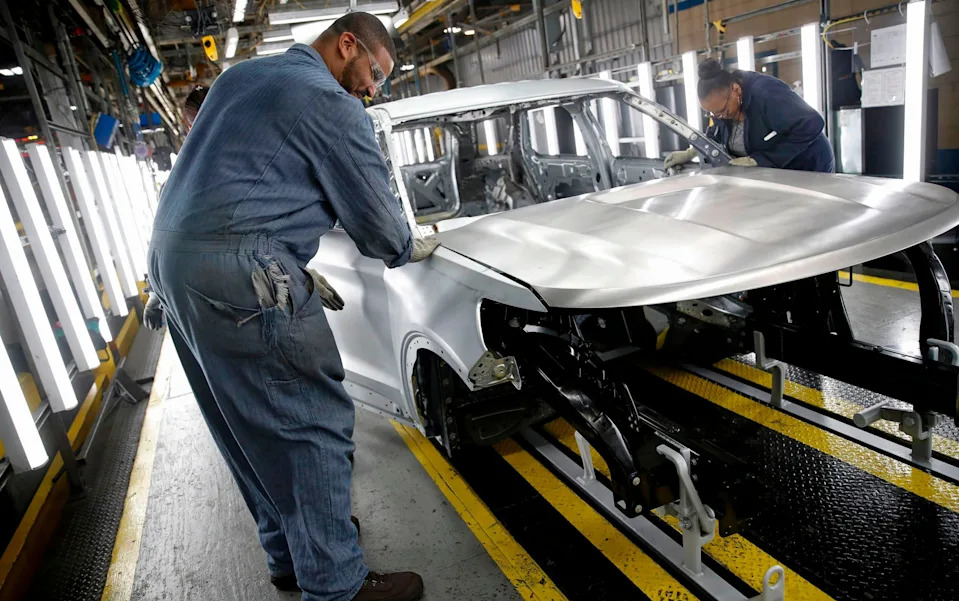
03:50 PM BST
Xi Jinping urges unity against ‘shocks to current international order’
Xi Jinping has called for Asian nations to unite in resisting geopolitical confrontation, unilateralism and protectionism, writes Julia Amann .
The Chinese leader made the comments while visiting Malaysia as part of a Southeast Asian tour which also includes Vietnam and Cambodia.
During an event with Anwar Ibrahim, the Malaysian prime minister, Xi reaffirmed his commitment to deepening cooperation on infrastructure development, tourism and agriculture.
He said: “In the face of shocks to the current international order and economic globalisation, our two nations will stand united with other countries in the region to jointly resist the undercurrents of geopolitical and camp-based confrontation, overcome the countercurrents of unilateralism and protectionism, and safeguard the promising prospects for development in our shared Asian home.”
Xi also urged Malaysia and other countries of the Association of Southeast Asian Nations regional bloc to resist supply chain disruptions and “excessive tariffs” with openness and greater cooperation, China’s state-run CCTV reported.
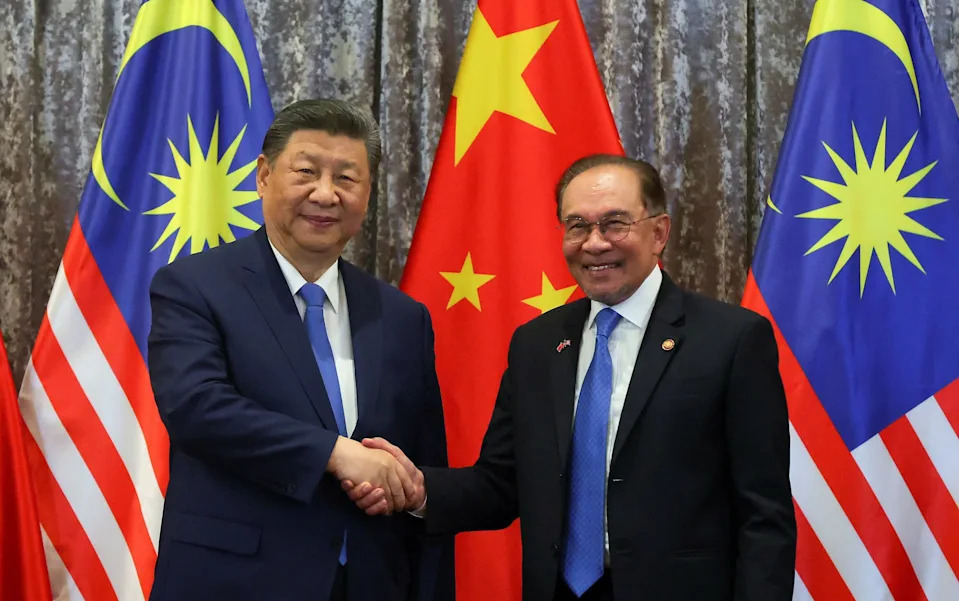
03:36 PM BST
Canada central bank suspends rate cuts
The Bank of Canada has held its interest rate at 2.75 percent, pausing a stream of recent cuts as it awaits more clarity on US trade policy and tariffs.
Governor Tiff Macklem said: “What happens to the Canadian economy and inflation depends critically on US trade policy, which remains highly unpredictable.”
Mr Macklem said the Bank of Canada was holding fire until it gained “more information about both the path forward for US tariffs and their impacts”, for it was still not known which tariffs would be imposed, at what rate and for how long.
He added: “The dramatic protectionist shift in US trade policy and the chaotic delivery have increased uncertainty, roiled financial markets, diminished global growth prospects and raised inflation expectations.”
The governor refrained from issuing their customary economic and inflation projections, saying uncertainty made the forecasts “of little use as a guide to anything”, and instead offered two scenarios.
In the first ideal scenario, the new tariffs are “negotiated away”, growth initially stalls before rising moderately and inflation dips below 2pc in 2025.
In the less cheery scenario, the central bank predicts a “long-lasting global trade war” where inflation rises above 3pc and Canada enters a recession for a year before growth gradually returns in 2026, remaining soft through 2027 as “US tariffs permanently reduce Canada’s potential output and lower our standard of living”.
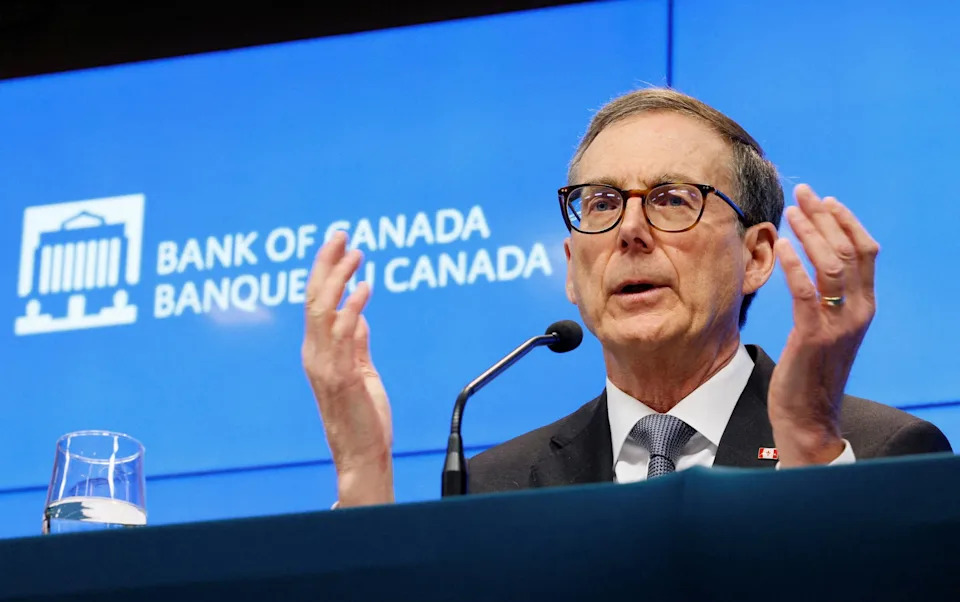
03:03 PM BST
Wall Street falls on opening
Wall Street has opened lower as AI-chip heavyweight Nvidia suffered a bruising premarket trading in response to new US controls on chip exports to China.
The tech-heavy Nasdaq was down 2.3pc, while the Dow Jones fell 0.8pc and the S&P 500 slipped 1.4pc.
The CBOE volatility index, Wall Street’s “fear gauge,” ticked up 1.6 points to 31.72 after falling for the last three sessions, as the global trade war found a new flashpoint.
Chris Zaccarelli of Northlight Asset Management said uncertainty would likely breed inertia.
He said: “I would expect investors to be slightly less willing to buy stocks of chipmakers, technology companies and things like that until they have a more clear picture as to what the final rules of the road will be.”
Investors will closely monitor a speech by the US Federal Reserve Chair Jerome Powell later in the day for indications on how the central bank will respond to the market’s volatility, coupled with growth worries.
02:53 PM BST
WTO revises trade forecast from solid growth to decline
The World Trade Organisation has slashed its forecast for global trade from solid growth to a decline, warning that US tariffs could lead to the worst slump since the Covid-19 pandemic, writes Julia Amann .
The WTO forecasted trade in goods to fall by 0.2pc this year, down from its expectation in October of a 3pc expansion.
The reversal comes after Donald Trump imposed sweeping global tariffs, as well as extra duties on steel and car imports, before pausing higher duties on a dozen economies earlier this week.
The trade war between China and the US has intensified, as each country incrementally raised duties on the other’s exports.
Should Mr Trump reintroduce the full rates of his broader tariffs it would reduce goods trade by 0.6pc, with a further 0.8pc cut from spillover effects beyond US trade, the WTO said.
The WTO also predicted a decline in growth in commercial services trade, now forecast to grow by 4pc in 2025 and 4.1pc in 2026, falling short of baseline projections of 5.1pc and 4.8pc.
Ngozi Okonjo-Iweala, the WTO director general, said: “The enduring uncertainty threatens to act as a brake on global growth, with severe negative consequences for the world, the most vulnerable economies in particular.”
02:40 PM BST
‘We’re taking him to court,’ says Newsom
Gavin Newsom, the governor of California, has sought to drive a wedge between his state and the federal government by taking the president to court.
He wrote on X: “Donald Trump does not have the authority to unilaterally impose the largest tax hike of our lifetime with his destructive tariffs.
“We’re taking him to court”.
Mr Newsom, a Democrat considered to be a likely candidate to run for president in 2028, and Rob Bonta, the California attorney general, are seeking a court order to immediately block the levies.
01:58 PM BST
Bunzl shares dive 25pc amid tariff uncertainty
Bunzl, the British distribution giant, has blamed “macroeconomic uncertainty” for a slump in sales, sending its shares spiralling more than 25pc.
The FTSE 100 group had more than £2bn wiped off its value and was set for its worst day on record as it cut its 2025 forecast and paused its share buyback programme.
Frank van Zanten, the chief executive, said he was disappointed with the performance in the first quarter of a “challenging trading environment”.
He said: “We are taking decisive action to improve performance in the group, particularly with regards to execution in our largest business in North America.”
Bunzl has forecasted moderate revenue growth and operating margin to end the year below 8pc, compared with 8.3pc in 2024.
01:57 PM BST
California to contest Trump tariffs in court, says Newsom
California plans to sue to block Donald Trump’s tariffs as the state faces a devastating blow from the trade barriers.
Gavin Newsom, the governor of California, has announced the state will fight in the courts to stop Mr Trump’s tariffs, accusing the president of overstepping his authority.
The state has filed a lawsuit in San Francisco federal court challenging the president’s use of emergency powers to levy tariffs which have rattled stock markets and raised fears of recession.
Mr Newsom said: “President Trump’s unlawful tariffs are wreaking chaos on California families, businesses and our economy, driving up prices and threatening jobs.
“We’re standing up for American families who can’t afford to let the chaos continue.”
The lawsuit argues that Mr Trump’s use of the International Emergency Economic Powers Act to bypass Congress and impose tariffs is unlawful.
Mr Trump became the first president to use the 1977 statute to impose tariffs, doing so by declaring a national emergency from the “unusual and extraordinary threat” of undocumented immigrants and illegal drugs moving through US borders.
The announcement comes days after Mr Newsom asked countries to exempt Californian exports from retaliatory tariffs.
Rob Bonta, the state’s attorney general, said: “The president’s chaotic and haphazard implementation of tariffs is not only deeply troubling, it’s illegal.
“Californians are bracing for fallout from the impact of the president’s choices. From farmers in the Central Valley to small businesses in Sacramento and worried families at the kitchen table, this game the president is playing has very real consequences for Californians across our state.”
The pair are expected to hold a joint press conference later on Wednesday in Central Valley, home to farmers bracing for the fallout from the global trade war.
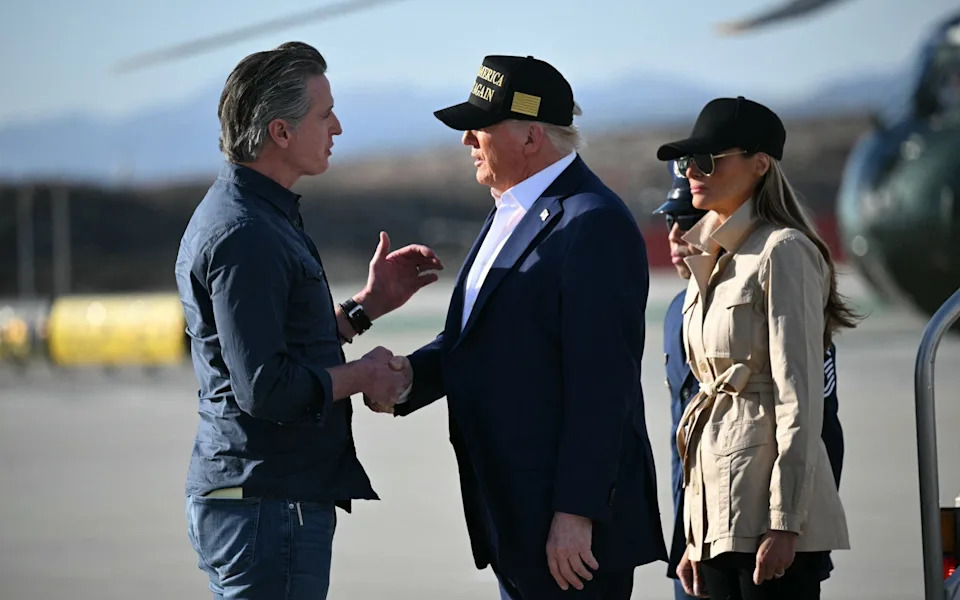
01:22 PM BST
Hong Kong Post suspends all packages to US
Hong Kong Post has suspended the shipment of all packages bound for the US, accusing the Trump administration of “bullying” through tariffs.
Donald Trump has imposed tariffs totalling 145pc on China and Hong Kong, while China has responded with levies of 125pc on the US.
Hong Kong Post, the government department responsible for postal services, has told those wishing to send items to the US to “be prepared to pay exorbitant and unreasonable fees due to the US’s unreasonable and bullying acts”.
On May 2, the US is also set to halt its “de minimis” provision for packages from China and Hong Kong under which goods valued at under $800 and sent direct to consumer enter the country tariff-free.
From the beginning of May, those packages will be subject to a 90pc tariff or a flat fee of $75.
Trump has said that packages from China and Hong Kong are being targeted because fentanyl and its precursor ingredients have been shipped to the US under the de minimis provision.
Postal items containing only documents would not be affected by Hong Kong Post’s halt in shipments.
DHL said it would continue to process shipments from Hong Kong to the United States “in accordance with the applicable customs rules and regulations” and would “work with our customers to help them understand and adapt to the changes that are planned for May 2.”
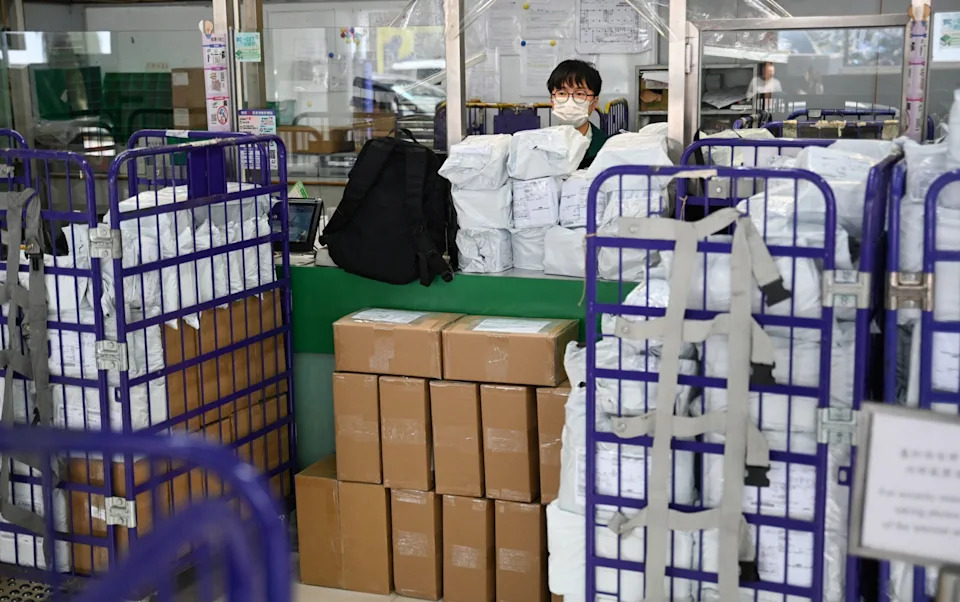
12:47 PM BST
Tech stocks tumble as Trump targets chipmakers
Tech stocks led a slump in global equities after the Trump administration raised trade tensions by imposing new restrictions on AI chip exports to China, writes Julia Amann .
The Nasdaq dropped as much as 2.4pc during premarket trading, led by chip designer Nvidia Corp which was set to lose around 6.6pc before the opening bell.
On Tuesday, the semiconductor company said it would take a $5.5bn (£4.1bn) hit from the new export controls on its H20 chip, which it designed specifically for the Chinese market and can be used to power artificial intelligence.
ASML, the world’s biggest supplier of computer chip-making equipment, was down 4.6pc, while Dell fell 3.2pc and Apple slumped 1.8pc.
Francois Antomarchi at Degroof Petercam Asset Management said, “We’re keeping a defensive stance during this period of uncertainty, while being increasingly cautious on tech stocks and industries that have a high share of their value chain exposed to China.
“There’s the question of knowing when we hit the bottom, geopolitically speaking, of the trade war, and I’m not sure we’re there yet.”
12:36 PM BST
Russia ‘offers to buy Boeing jets with frozen assets’
Russia has offered to buy Boeing aircraft using frozen state assets should a ceasefire materialise, according to Bloomberg citing a source in Moscow.
A purchase agreement could reportedly pave the way for an easing of sanctions in the event of a halt to the fighting, though Russia is said to be aware that frozen funds could not be used to buy aircraft before a ceasefire.
Brian Hughes, the National Security Council spokesman, responded to Bloomberg’s request to comment: “The US will not discuss any economic commitments until a ceasefire has been reached.”
The US and its allies have frozen around $280bn (£211bn) in Russian central bank reserves worldwide.
Boeing dismantled its Russian operation soon after Russia’s invasion of Ukraine in 2022, but the prospect of resuming operations has been raised in response to China’s targeting of the US plane maker.
Russia has previously requested the US lift sanctions against its Aeroflot airline and resume flights between the nations to little avail.
12:21 PM BST
Chinese exporters feel tariff pinch
Chinese exporters have spoken of diverting trade away from the US as Donald Trump’s tariffs threaten to redraw the world trade map, writes Max Head .
Zhang Haiyun, director of air purifier exporter Airdog, said her company halted shipping to the US after the announcement of President Trump’s ‘liberation day’ tariffs, which she says made freight companies unwilling to take new orders.
Speaking at China’s largest trade fair in Guangzhou, she said: “Everything is on hold.”
Some firms, particularly those who ship car parts and hardware fittings, have seen less disruption to exports to the US.
Angel Li at Great Link logistics firms aid that some clients have not called off their shipments, despite considering shipping fewer goods to the US.
Wallace Huang, export director of Weking group, has spied opportunity in turning to countries along China’s Belt and Road Initiative (BRI) infrastructure project in Asia, Africa and Europe.
He said: “We need to diversify our market. When the West is dark, the East is bright. The global market is huge.”
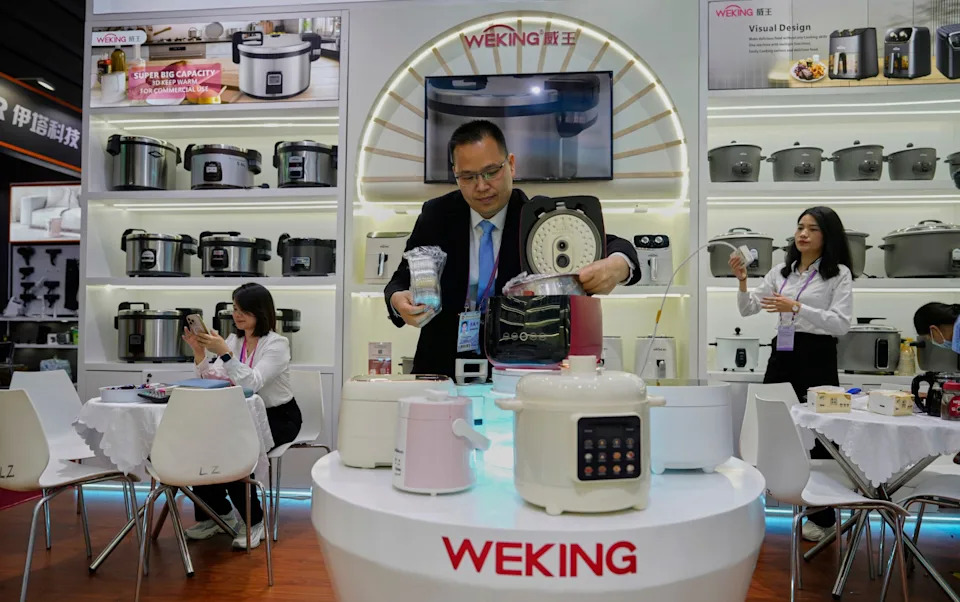
11:55 AM BST
No company can plan amid erratic tariffs, says Singapore PM
Lawrence Wong, the prime minister of Singapore, has warned that no company can make long-term investments amid dynamic trade wars.
Mr Wong said the trade war between the US and China would grind trade activity to a halt, the pain from which “will be felt everywhere”.
Donald Trump postponed his ‘reciprocal tariffs’ in July but the 10pc baseline tariff still applies to Singapore.
Mr Wong said: “No company can comfortably plan long-term investments while knowing that the tariff rates could be changed at a moment’s notice.
“What we are witnessing is the remaking of the global economy - not as one integrated system, but as bifurcated ecosystems centred around the US and China.”
On Monday, the trade ministry downgraded Singapore’s economic growth forecast this year to between zero and 2pc, from its previous forecast of 1-3pc.
Gan Kim Yong, the trade minister and deputy prime minister, has refused to rule out a recession as a result of the global uncertainty brought about by the Trump administration’s trade policy.
“Given potential downside risks, we cannot rule out the possibility of a recession this year,” he said on Wednesday.
Singapore will go to the polls on May 3, with Mr Wong’s People’s Action Party widely expected to continue its unbroken electoral streak dating back to 1965.
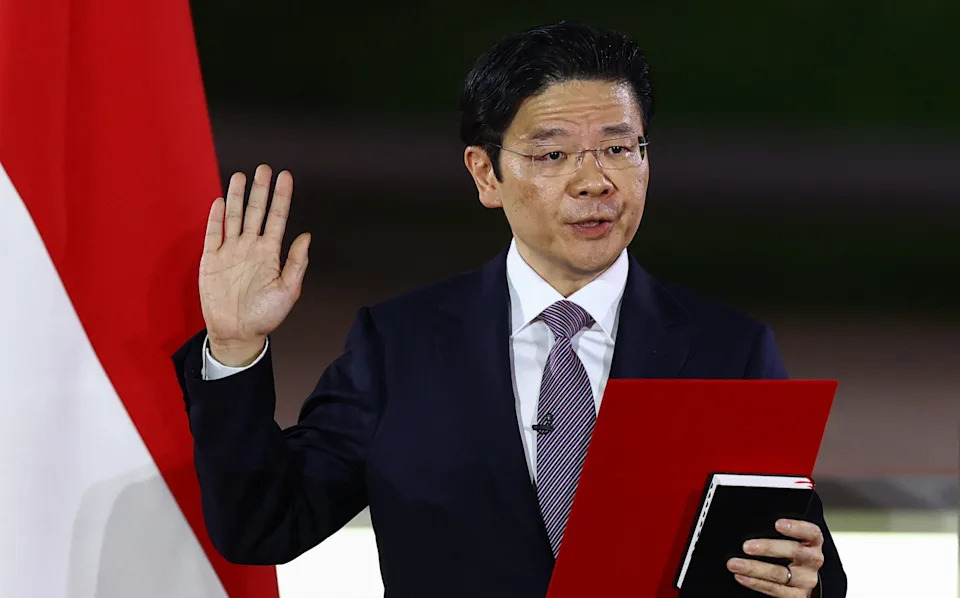
11:30 AM BST
Trump to hold tariff talks with Japan
Donald Trump is set to attend trade negotiations with Japan in Washington today.
In a post on Truth Social, the US president expressed hope that “something can be worked out” which is beneficial for both nations.
Ryosei Akazawa, Japan’s top negotiator, has travelled to Washington for the first time since the Trump administration imposed and then paused a 24pc reciprocal tariff on Tokyo.
Japan, the biggest investor into the US, still faces a 25pc levy on car exports to the US, as well as the baseline 10pc tariff imposed on most of America’s partners.
11:15 AM BST
‘New golden era’ for relations in Asia, says Xi Jinping
Xi Jinping has heralded a “new golden era” of relations between China and Malaysia as he embarked on a charm offensive tour of Southeast Asia.
Ahead of a bilateral meeting with Anwar Ibrahim, the Malaysian prime minister, in Kuala Lumpur on Wednesday, the Chinese president said he was keen to advance collaboration in artificial intelligence, the digital economy and green development.
The Chinese leader also met with Sultan Ibrahim Iskandar, Malaysia’s king, who later took to Facebook to exalt a deepening of ties during a time of widening “geopolitical gaps” around the world.
He said: “There is great potential for Chinese companies and investors to explore opportunities here as it is in line with the importance of regional connectivity and high-quality development under China’s ‘Belt and Road’ Initiative.”
Xi has been visiting Malaysia, Vietnam and Cambodia this week, making the case for China as a source of “stability and certainty” in the troubled waters of international finance and seeking to shore up trade with countries other than the US.
China’s economy expanded at a 5.4pc annual pace in January-March, the government said on Wednesday, buoyed by US stockpiling ahead of Donald Trump’s levies coming into effect.
The US has responded by sending Sean O’Neill, a senior State Department official, to Vietnam, Cambodia and Tokyo this week.
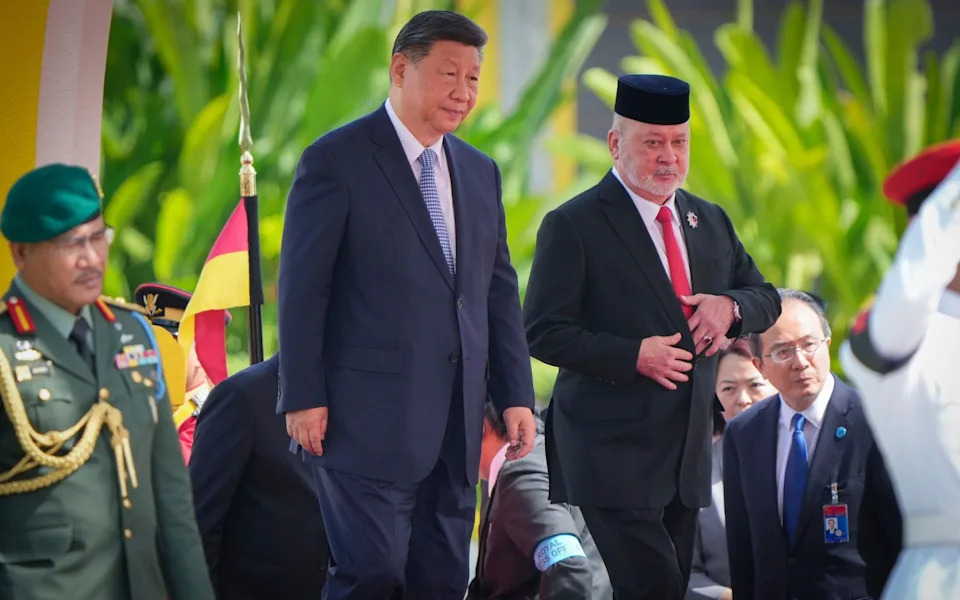
10:51 AM BST
Irish pharmaceutical exports to US soar amid tariff threat
The value of Ireland’s exports to the US soared more than 200pc year on year in February, according to the country’s statistics office.
Exports increased by €8.75bn (£7.5bn) to €12.9bn (£11bn), with medical and pharmaceutical items accounting for 91pc of that total.
The jump followed an 81pc uplift in January, as US drugmakers continue to stockpile products from Irish manufacturing hubs amid the uncertainty brought on by the Trump administration’s trade policy.
Donald Trump has advanced plans to impose tariffs on semiconductor and pharmaceutical imports by initiating trade probes led by the Commerce Department.
Buoyed by relatively low tax rates and a skilled workforce, Ireland has become an attractive destination for US pharmaceutical companies seeking to outsource elements of the production chain.
Ireland has amassed the second-largest trade surplus with the US of the EU nations, exporting a record €72.6bn in 2024, up 34pc from the previous year.
Speaking alongside Taoiseach (Irish prime minister) Micheál Martin at the Oval Office last month, Mr Trump said: “There’s a massive deficit that we have with Ireland... we want to sort of even that out as nicely as we can, and we’ll work together.”
Simon Harris, Ireland’s trade minister, said on Tuesday that the pharmaceutical sector was “more complex” than it has often been presented.
He told Bloomberg: “About 80pc of what US pharma companies export back to the US from Ireland is not the finished product, it goes into American factories, it creates jobs for American workers.”
10:21 AM BST
Inflation on track for ‘big step up’, warn economists
Inflation will gather pace in April as energy and water bill hikes push prices higher, an economist has warned.
Sanjay Raja of Deutsche Bank said policymakers could take solace in the lower than expected inflation for March, which came in at 2.6pc.
However, he said prices would rise again, even before any impact from US tariffs, although this would remain below the Bank’s second quarter forecast.
He said: “Inflation will take a big step up in April, pushing above 3.25pc as energy and water bills lead inflation higher.”
Mr Raja expects inflation to return to target by the middle of next year, as the Bank of England loosens the taps on the back of yesterday’s weak labour market data and today’s softer inflation score.
Inflation slowed to 2.6pc, according to the Office for National Statistics, down from 2.8pc in February and paving the way for interest rate cuts next month.
He said the index had been weighed down by weaker price rises for goods such as smart watches, communication equipment, musical instruments, pizza and quiches, as well as recreational services, accommodation prices and transport prices.
10:05 AM BST
Eurozone inflation falls to 2.2pc
Eurozone inflation fell last month, official data confirmed, all but confirming that the European Central Bank (ECB) will cut interest rates tomorrow.
The consumer prices index dropped from 2.3pc in February to 2.2pc, according to Eurostat.
Money markets indicate there is a 98pc chance that the ECB will reduce borrowing costs again to 2.25pc as the European economy prepares for a hit from US tariffs.
09:42 AM BST
Europeans four times as exposed to US assets than in 2010
European investors are four times more exposed to US assets than they were in 2010, an economist has said, outlining the risks faced by consumers from downturns on Wall Street.
George Saravelos of Deutsche Bank said foreigners now own around $7 trillion (£5.3 trillion) of American fixed income and $18 trillion (£13.6 trillion) of American stocks.
Since 2010, ownership has risen by $3 trillion in bonds and $15 trillion in equities, with a “remarkable” 90pc accounted for by the appreciation in underlying US asset values rather than fresh flows.
The total share of total US portfolio holdings has quadrupled in Europe, from around 5pc in 2010 to 20pc in 2024, while in Japan, it has doubled from 8pc to around 16pc.
Mr Saravelos said: “The more benign interpretation of our analysis is that foreigners have merely passively tracked rising aggregate valuations of US equities and issuance of US bonds.
“The more worrying interpretation is that this has left foreigners - especially Europeans - with a huge overweight in their portfolios relative to history, especially in US equity markets which tend to be currency unhedged.”
09:29 AM BST
Pound rises despite expected interest rate cut
The pound gained as the dollar remained under pressure over concerns about the US economy.
Sterling was up 0.4pc to $1.328 despite money markets pricing in an interest rate cut by the Bank of England next month as official figures showed inflation fell further than expected to 2.6pc last month.
The pound slipped 0.4pc against the euro, which was worth 85.6p.
08:51 AM BST
Trump seeking trade deals to ‘isolate China’
Donald Trump is seeking to agree swift trade deals with a number of countries in an effort to isolate China, economists have said a day after JD Vance indicated there was a “good chance” of a UK-US agreement.
The US president has indicated about 75 countries have indicated willingness to hold trade negotiations with his administration after he opted to pause his “reciprocal” tariffs for 90 days against all countries but China.
Mohit Kumar, chief Europe economist at investment bank Jefferies, said the US cannot win a tariff battle with China but suggested it could secure “more favourable terms” before backing down if it is successful in isolating Beijing.
He said he expects trade deals to be struck with a majority of the 75 countries holding talks within the 90 day reprieve period.
The most important of these would be Japan, South Korea, India and the UK, although he said “negotiations with the EU will prove more tricky”.
He said: “In the near term, we see US administration objective function as trying to score easy wins by agreeing to deals with a number of countries, while trying to isolate China.”
08:32 AM BST
European stocks fall as Nvidia warns of £4bn blow
European shares slipped as Nvidia said it would take a $5.5bn hit from new US export restrictions to China, raising concerns about corporate profits.
The pan-European Stoxx 600 index fell 0.7pc, after two days of gains although market moves were tamer compared to a week ago.
Nvidia shares dropped 6.3pc in after-market trading in New York as it said its first quarter results would be hampered by new export controls imposed on its H20 chip, which can be used to power artificial intelligence.
Adding to tech woes, ASML, the world’s biggest supplier of computer chip-making equipment, warned that tariffs were increasing uncertainty for its outlook for 2025 and 2026, sending its shares 7.4pc lower.
Germany’s Dax index fell 0.9pc and France’s Cac 40 fell 0.8pc. The FTSE 100, which has limited exposure to tech stocks, was less severely hit, down 0.3pc.
08:11 AM BST
UK markets slump at the open
The FTSE 100 fell at the open as the US raised further barriers to global trade as it limited exports of Nvidia chips to China.
The UK’s flagship stock index was down 0.3pc to 8,228.88 while the midcap FTSE 250 dropped 0.4pc to 19,188.75.
08:08 AM BST
Gold hits fresh record high over recession fears
Gold rose to a fresh high amid the escalating trade war between the world’s two largest economies.
Bullion gained as much as 2.4pc to climb above $3,297 an ounce for the first time, surpassing the previous all-time peak set on Monday.
The precious metal has climbed more than 20pc this year and hit a series of record highs as fears grow about a possible global recession.
Donald Trump on Tuesday urged China to reach out to begin trade negotiations after Beijing told airlines not to take any further deliveries from planemaker Boeing.
Beijing announced unexpectedly today that it has appointed a new trade negotiator.
07:53 AM BST
Asian tech stocks slump over Nvidia blow
Tech stocks dropped sharply in Asia after Nvidia warned it faces a $5.5bn (£4.1bn) hit as a result of Donald Trump’s deepening trade war with China.
Shares of Japanese testing equipment maker Advantest dropped as much as 7.8pc while Korean memory maker SK Hynix slumped 3.9pc.
Nvidia’s top semiconductor supplier TSMC fell 2.9pc.
Tim Waterer, chief market analyst at KCM Trade in Sydney, said: “It is a reminder of the potential susceptibility of tech stocks to the ongoing prickly relationship between the US and China regarding semiconductors.
“There is a reliance on the H20 chip from big name players in the Asian tech space, so any moves which could impact supply will be a drag on the broader sector.”
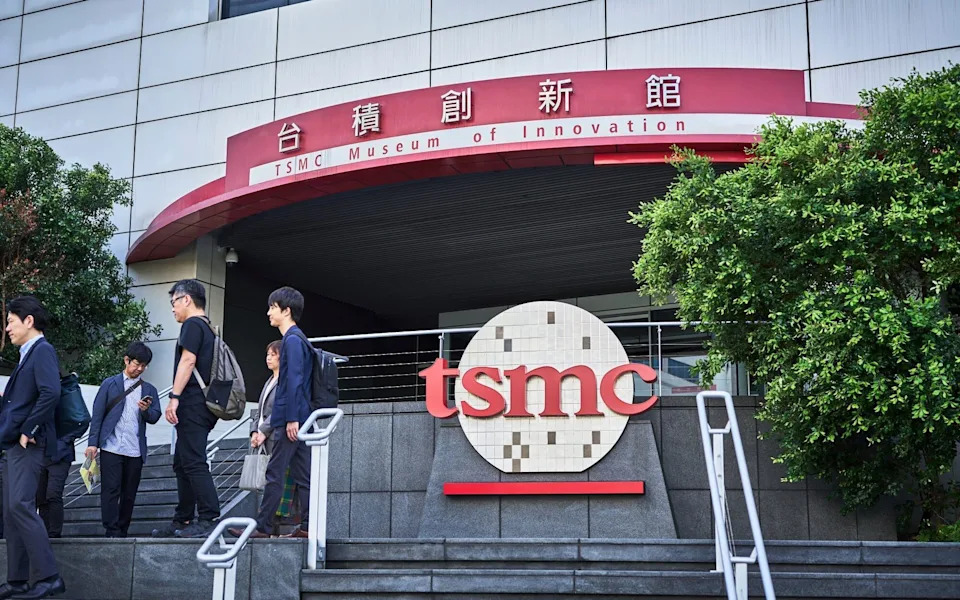
07:45 AM BST
Inflation slows to 2.6pc ahead of interest rate decision
Inflation eased back last month, paving the way for interest rate cuts next month in a boost for Rachel Reeves.
Prices, as measured by the consumer prices index (CPI), rose by 2.6pc in the year to March, according to the Office for National Statistics (ONS), down from 2.8pc in February.
The drop is more than analysts’ expectations of a fall to 2.7pc.
Statisticians said the fall was driven by a drop in petrol and diesel prices, as escalating trade tensions pushed down expectations for global growth.
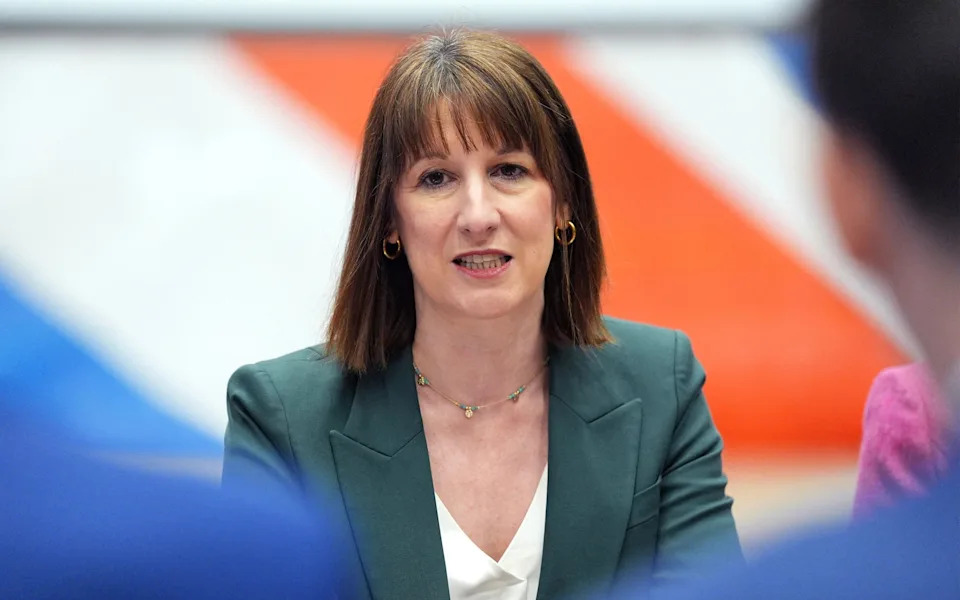
07:42 AM BST
China appoints new trade negotiator as tariff war deepens
China unexpectedly appointed a new trade negotiator as Donald Trump’s trade war escalated further.
Li Chenggang will take over from veteran trade tsar Wang Shouwen with the Chinese envoy to the World Trade Organisation.
It was unclear if Wang, 59, who assumed the key role at the commerce ministry in 2022, had taken up a post elsewhere. His name was no longer on the ministry’s leadership team, according to the ministry’s website as of Wednesday.
Li, 58, was a former assistant commerce minister during President Trump’s first administration.
The shift within the top leadership at the commerce ministry comes as Beijing pursues a hardline stance in the intensifying trade war with Washington triggered by Trump’s steep tariffs on items imported from China.
Alfredo Montufar-Helu, a senior advisor to the Conference Board’s China Center, said: “This is certainly a change given how quickly trade tensions have escalated since Liberation Day, especially given Wang Shouwen’s experience in negotiating with the US since the first Trump administration.”
He added: “We can only speculate as to why this happened at this precise moment; but it might be that in the view of China’s top leadership, given how tensions have continued escalating, they need someone else to break the impasse in with both countries find themselves and finally start negotiating.”
07:34 AM BST
China admits growth faces ‘pressure’ from Trump tariffs
China revealed growth slowed down in the first three months of the year as it warned it faced “certain pressures” from Donald Trump’s trade blitz.
The world’s second-largest economy expanded by 1.2pc in the first quarter, slowing from 1.6pc in the three months to December.
China insisted its economy outstripped expectations with growth of 5.4pc compared to the same period a year earlier, which was unchanged from the fourth quarter, but ahead of forecasts for 5.1pc.
The data Wednesday offered a first glimpse into how the deepening Trump trade war fears has affected China’s fragile recovery,.
Sheng Laiyun, deputy commissioner of the National Bureau of Statistics, said: “At the moment, the imposition of high tariffs by the US will put certain pressures on our country’s foreign trade and economy.”
But, he said, “it will not change the general trend of China’s economy continuing to improve in the long run”.
07:29 AM BST
Nvidia warns over $5.5bn hit from Trump trade war
Nvidia has warned it will take a $5.5bn (£4.1bn) hit as Donald Trump’s trade war raises barriers to its operations in China.
The semiconductor chip manufacturer said it had been informed on Monday that it would need a licence to export its high-powered H20 technology to China and a handful of other countries.
Shares fell 6.3pc in after-market trading in New York while Asian technology stocks slumped overnight after the company said it would take a $5.5bn blow in its results for the first three months of this year.
It said this was linked to stockpiles and “purchase commitments” tied to the H20 line of chips, which are designed to be used to power artificial intelligence. It has been told the restrictions would apply “for the indefinite future”.
The US government said the new rules addressed concerns that “the covered products may be used in, or diverted to, a supercomputer in China”.
China’s DeepSeek artificial intelligence chatbot caused turmoil among tech companies when it was unveiled earlier this year , having reportedly been developed on a relative shoestring budget of $6m.
The export licence move is the latest signal that Trump wants to ramp up pressure on China, which faces 145pc US tariffs.
It comes despite the US president’s announcement last week that smartphones and consumer electronics would be exempted from his global tariffs.
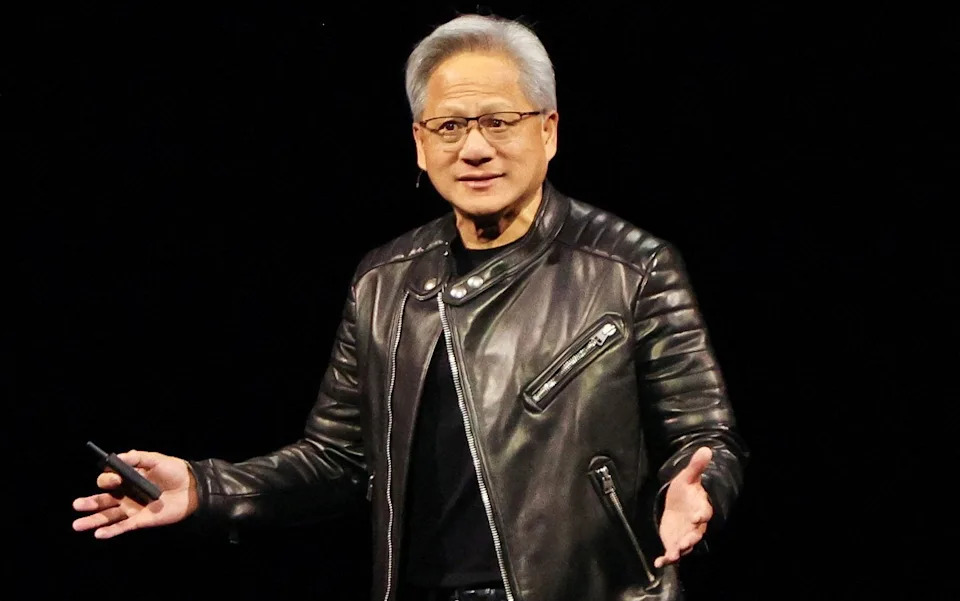
07:18 AM BST
Good morning
Thanks for joining us. Nvidia has warned it will take a $5.5bn (£4.1bn) hit in its first quarter results after Donald Trump deepened his trade war against China.
The chip giant said it had been told on Monday it faced new export controls which would need it to hold a licence to sell its powerful H20 technology to the world’s second largest economy.
5 things to start your day
-
Surge in immigration risks ‘pushing down wages’ for low-paid Britons | Increase in new arrivals can undermine pay growth for low-skilled workers, finds IMF study
-
Russian rouble crowned world’s best-performing currency as dollar declines | The currency is being buoyed record-high interest rates of 21pc as Moscow battles inflation
-
Use trains instead of planes, City accountancy giant tells staff | Grant Thornton urges employees to use eco-friendly options when travelling abroad
-
Lucy Burton: The unions are holding the country to ransom. And Starmer can do nothing about it | Britons are paying the price as Labour loses control of its traditional support base
-
Ambrose Evans-Pritchard: Trump has already lost his trade war against China | Beijing is hardly likely to roll over given its financial and global trading strength
What happened overnight
Shares were mostly lower in Asia after Nvidia announced it had been dragged into Donald Trump’s trade war.
The chip maker Nvidia’s shares fell 6.3pc in after-hours trading after it said the US had imposed stricter controls on its exports of one of its computer chips designed for use in artificial intelligence.
Stocks in China led the regional declines after the Chinese government reported the world’s second-largest economy revealed growth slowed to 1.2pc in the first three months of the year from 1.6pc in the last quarter of 2024.
Hong Kong’s Hang Seng dropped 2.5pc to 20,922.54, while the Shanghai Composite index gave up 0.9pc to 3,237.60.
In Tokyo, the Nikkei 225 index shed 0.9pc to 22,948.18.
South Korea’s Kospi fell 0.7pc to 2,461.45, while in Australia, the S&P/ASX 200 gained 0.3pc to 7,781.10.
India’s Sensex was little changed and Bangkok’s SET rose 0.2pc.
On Wall Street, the three main indexes closed down on a rare quiet day for financial markets.
The S&P 500 fell 0.2pc, to 5,396.63, the Dow Jones Industrial Average lost 0.4pc, finishing at 40,368.96, and the Nasdaq edged down by less than 0.1pc, closing at 16,823.17.
In the bond market, the yield on benchmark 10-year US Treasury notes fell to 4.339pc from 4.352pc late on Monday.
Broaden your horizons with award-winning British journalism. Try The Telegraph free for 1 month with unlimited access to our award-winning website, exclusive app, money-saving offers and more.



